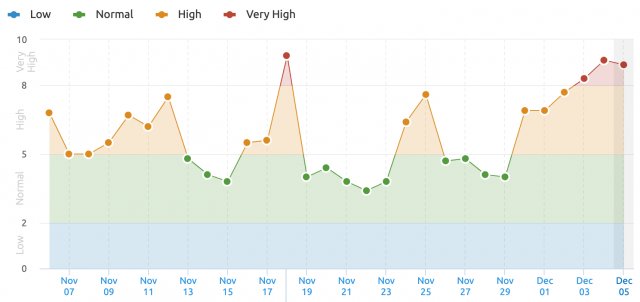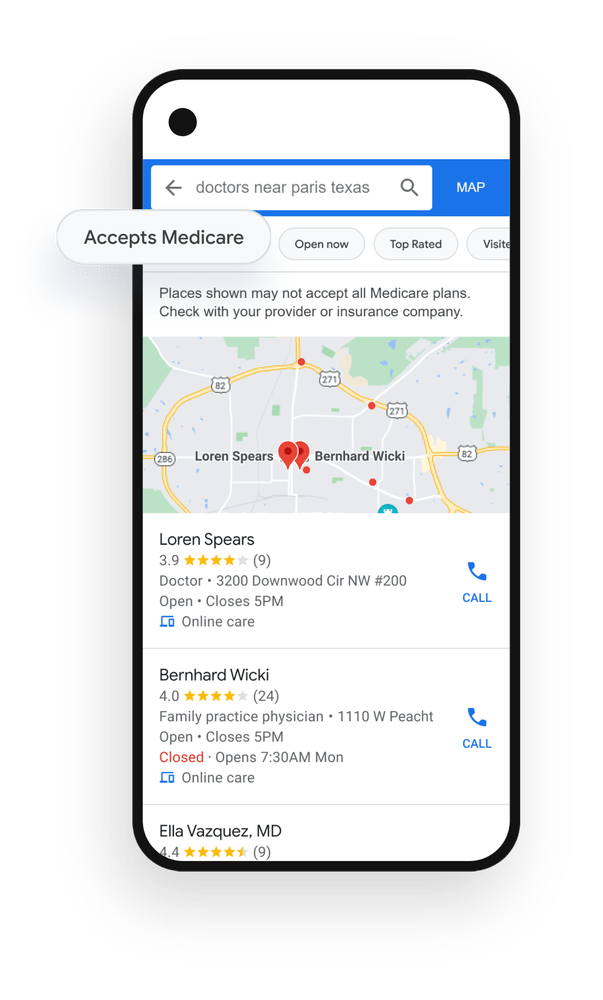In this week’s update, learn about ranking volatility due to the product reviews update; Twitter’s ban on sharing images of private individuals; new GBP and search features for healthcare; a checklist for Yelp profiles; a roundup of current GBP issues; and a guide to Instagram for local businesses.
High Ranking Volatility Due to Google Product Reviews Update
The December 2021 product reviews update, which began rolling out in Google Search on December 1, is producing a high degree of volatility in site rankings, according to data from tracking companies including SEMRush, RankRanger, Accuranker, and others. A number of SEOs in forums and on Twitter are reporting large gains or losses for individual sites impacted by the update. Barry Schwartz speculates that the impact of this update may be greater than that of the original product reviews update back in April.
The update affects English language pages only, and will be rolling out for a total of about three weeks. Based on documentation from Google, the December reviews update, like the original update in April, is designed to favor sites with review content that consumers will find to be helpful and authoritative. Reviews Google deems valuable may exhibit characteristics like video or audio clips demonstrating experience with a product, as well as (for affiliate sites) links to multiple sellers, giving consumers more choice where to purchase a product.
According to Google’s Alan Kent, the update is “mostly relevant to sites that post articles reviewing products. Think of sites like ‘best TVs under $200’.com. Goal is to improve the quality and usefulness of reviews we show users.” Any evidence that the update has had an impact outside of product review sites may be due to overlap with the November core update.

Ranking volatility due to product review update, courtesy SEMRush / Search Engine Roundtable
Twitter Bans Image Sharing Without Consent
Twitter has announced an update to its policies that bans publication of images of private individuals without their consent. The platform had already banned publication of other kinds of personal information, such as addresses and identity documents, as part of an effort to fight doxxing and other types of privacy invasion.
Twitter will not begin requiring consent for photos to be published in the first place, but rather will honor requests to have photos taken down after the fact by the individuals depicted. The policy exempts public figures (except in cases of harassment) as well as content shared in what Twitter deems to be the public interest.
According to a statement from Twitter, “This policy update will help curb the misuse of media to harass, intimidate, and reveal the identities of private individuals, which disproportionately impacts women, activists, dissidents, and members of minority communities.”
Beginning today, we will not allow the sharing of private media, such as images or videos of private individuals without their consent. Publishing people’s private info is also prohibited under the policy, as is threatening or incentivizing others to do so.https://t.co/7EXvXdwegG
— Twitter Safety (@TwitterSafety) November 30, 2021
Healthcare Companies Get Standard COVID Testing Attributes, New Search Filters in GBP
As shared by Krystal Taing on Twitter, healthcare companies can now directly control information in their Google Business Profiles related to COVID testing, including whether testing is offered, whether drive-through testing is available, whether testing requires an appointment or a referral, and whether testing comes with special restrictions. Previously, these attributes could only be provided to Google via designated third parties, but now they appear in the Google Business Profile Manager dashboard and can be configured directly. When enabled, these attributes appear prominently in searches for COVID testing nearby.
In related news, Google has added a new filter to healthcare searches that lets users easily identify providers that accept Medicare, as well as new attributes where healthcare providers can specify the languages spoken at their facilities. Google supports more than a dozen languages, including American Sign Language. Medical providers can configure insurance accepted and languages spoken in their Google Business Profiles.

Courtesy Google
A Checklist for Yelp Profiles
Yelp has published a new checklist of updates business owners should make in order to get the most out of their Yelp profiles, as well as stats supporting the importance of recommended actions. The basics are to claim your Yelp profile, provide basic contact information as well as accurate hours and photos depicting “your best work,” and enable communication tools so you can engage with customers using the platform.
Review response is strongly encouraged, with Yelp reporting that over 75% of consumers expect businesses to respond to a review within a week and 20% expect a response within one day. Yelp also reminds us that responding with a personalized message within a day makes it 33% more likely that a reviewer will edit their review to boost the star rating.
Yelp also recommends that businesses keep track of their Yelp engagement metrics, configure special hours for the holidays, and add new information as your business evolves. These and other recommendations are provided in the form of a checklist that breaks down the frequency of activities into daily, weekly, monthly, and quarterly priorities.
Roundup of Current GBP Technical Issues
Jason Brown has a helpful compendium on the Local U blog of current technical issues affecting Google Business Profile users. These include:
- Inability to clear addresses for service-area businesses (cleared addresses keep reappearing)
- When a service-area business moves, Google still shows the business in searches for the old location
- Some businesses whose profiles are in suspension are finding they are unable to be reinstated, meaning they must create a new profile and attempt to transfer reviews (review responses, photos, posts, and analytics are lost)
- Even more unfortunately, some businesses are getting caught in a suspension loop whereby their listings repeatedly fall into suspension as soon as they are reinstated
- The new call history feature is reportedly routing some calls to the wrong businesses
Be grateful if you haven’t been affected by any of these issues, all of which could have a major impact on your business.
A Guide to Instagram for Local Businesses
A new guide from Erin Jones helps local businesses understand the use of Instagram as a promotional platform. Jones recommends that businesses publish accurate contact information, develop and maintain a consistent brand voice, and define clearly the goals of the Instagram account and the types of customers the business wants to attract, crafting content that will help to meet those goals and appeal to that specific audience. She also recommends defining success metrics with a focus on engagements and conversions. Posts should cover a range of content types, with about one in every three to five posts containing a direct conversion-oriented call to action. Jones has many additional recommendations covering topics such as content libraries, hashtags, working with local influencers, and the proper use of location tagging. Check out the full post to learn more.
Damian Rollison
Subscribe to Local Memo!
Signup to receive Local memo updates and the latest on localized marketing, delivered weekly to your inbox.